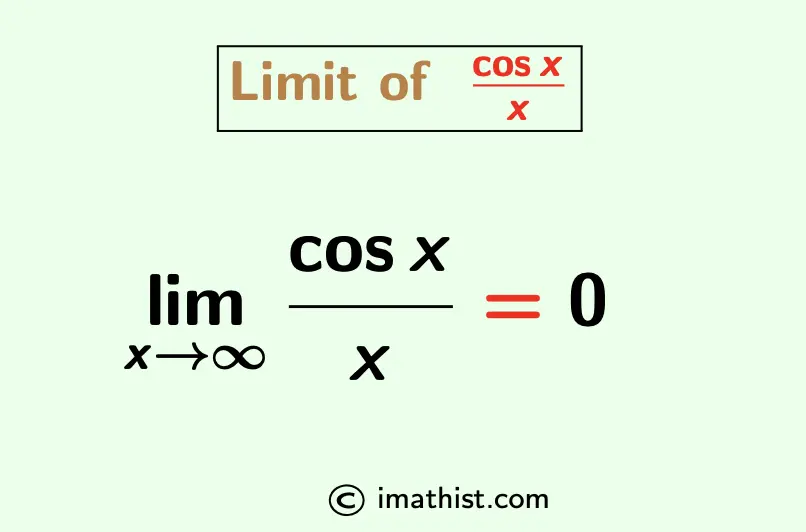The limit of cosx/x as x approaches infinity is equal to 0. The formula of limx→∞ (cos x)/x is given below:
$\lim\limits_{x \to \infty} \dfrac{\cos x}{x}=0$.

Here we find the limit of (cos x)/x when x tends to infinity.
Limx→∞ (cos x)/x = 0 Proof
Question: What is the limit of cosx/x when x tends to infinity?
| Answer: The limit of cosx/x is equal to 0 when x tends to infinity. |
Explanation:
The limit of cosx/x, when x→∞, will be computed using the Sandwich/Squeeze theorem of limits. We know that the value of cosx lies between -1 and 1, that is,
-1 ≤ cosx ≤ 1
For very large values of x, it follows that
$\dfrac{-1}{x} \leq \dfrac{\cos x}{x} \leq \dfrac{1}{x}$
Taking x→∞. we obtain that
limx→∞ $\dfrac{-1}{x} \leq$ limx→∞ $\dfrac{\cos x}{x} \leq$ limx→∞ $\dfrac{1}{x}$
⇒ 0 ≤ limx→∞ $\dfrac{\cos x}{x}$ ≤ 0
∴By the Sandwich theorem, the given limit
$\lim\limits_{x \to \infty} \dfrac{\cos x}{x} =0$
So the limit of cosx/x is equal to 0 when x tends to infinity, and this is proved by the Sandwich/Squeeze theorem of limits.
Read Also: Limit of sinx/x when x→∞
More Limits
FAQs
Q1: What is the limit of cosx/x when x tends to infinity?
Answer: The limit of cosx/x is equal to 0 when x tends to ∞, that is, limx→∞ cosx/x =0.